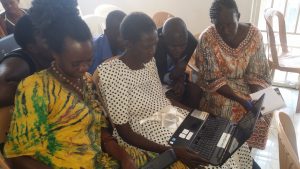Author: Simon Peter Ogwang
Project Coordinator at Transparency International Uganda
Following the decline and eventual end of the rebel insurgency in Northern Uganda, many civil society organizations moved into the region to rebuild and improve service delivery by ensuring improved accessibility of resources to intended beneficiaries, however what is important to note is that, the use of technology for people empowerment and engagement was hardly available at the time in the region. With the introduction of Transparency International Uganda’s current health project, funded by SPIDER in the Districts of Lira and Oyam, the use of ICT for people empowerment and engagement has been widely embraced.
Targeting health workers absenteeism, the projects currently uses a toll free call center (0800200188) for community reporting of key challenges in health service delivery. When these reports are received from community voluntary accountability committees, frequent health centre verification visits are conducted by TIU to verify information and also ensure evidence based reporting. As a result of using the existing structures localized solutions are realized to counter the said challenges.
In addition, the project uses social media platform (www.facebook.com/StopAbsenteeism) and twitter, as means of sharing community information and also interact with a wider spectrum of communities in addressing local issues to a national and global platform. The project also widely uses the mass media, for instance radio programs in both health and education projects have been instrumental as a platform for empowering and engaging all stakeholders, it is during these talk-shows that people call and immensely contribute by asking questions, giving supplements and sharing specific challenges from their communities regarding service delivery and need for improvement.
In using all this ICT platforms Transparency International Uganda greatly empowered and involved a wider community in demanding social accountability of health workers within the target project areas.
Given the public outcry, TIU hope in the near future to conduct maternal health diagnosis radio talk-shows, bringing on board a Government medical doctor to educate the community on prenatal and postnatal healthcare, all geared towards improving mother and child health and this is something other civil society organizations can also start in any part of the country.
There are several ways ICT can be used to create social impact in developing countries however if we are to realize a joint and sustainable impact in a given sector, the selection and use of the technological platform needs to be carefully taken care of by considering literacy levels of target beneficiaries and their adoptability to technological advances, for example short message services (SMS) can hardly work for an illiterate community because they cannot read and write yet they could widely use bulk voice calls which sends recorded voice message, toll free help line and local radio campaigns which can enable them express themselves in the language they best understand.
When selecting a given technological tool by CSOs and government, it’s important to forecast the sustainability of the technology and results by looking at what happens after funding by making sure primary beneficiaries and all other stakeholders understand the value of information always received from them, with reference to what the organization/government has done with the information received through a given ICT platform to positively impact onto the lives of people by taking appropriate actions, this would make the technology end use value their information and even be willing to meet the cost of sharing the information whether through SMS, email or voice calling as long as they are sure something will be done thereafter.
Adaptability to a given technological platform may not only be influenced by inability to use technology but attitude, ignorance and misuse of a given platform by other people and that’s why till today some staff have failed to use social media to promote organizational work. Some people focus more on security concerns before using ICT platform other than putting more focus on how much the technology is able to help them achieve; for all security risk, risk management can be put in place to ensure that security for the user is ensured.
What CSOs, government and private sector can do to build their ICT capacity in using for community sustainable develop is to benchmark from other entities within the similar field of work in order to re-strategize their approach; another way would be creating and joining ICT networks like ICT 4 democracy in East Africa to share best practice in using ICT for sustainable development. Attending and participating in ICT forums and workshops like Internet Governance Forum, Stockholm Internet Forum, mobile communication for development (M4D) among others to share practice experience and learning the impact and use of the different ICT tools/platforms from those already using ICT.
